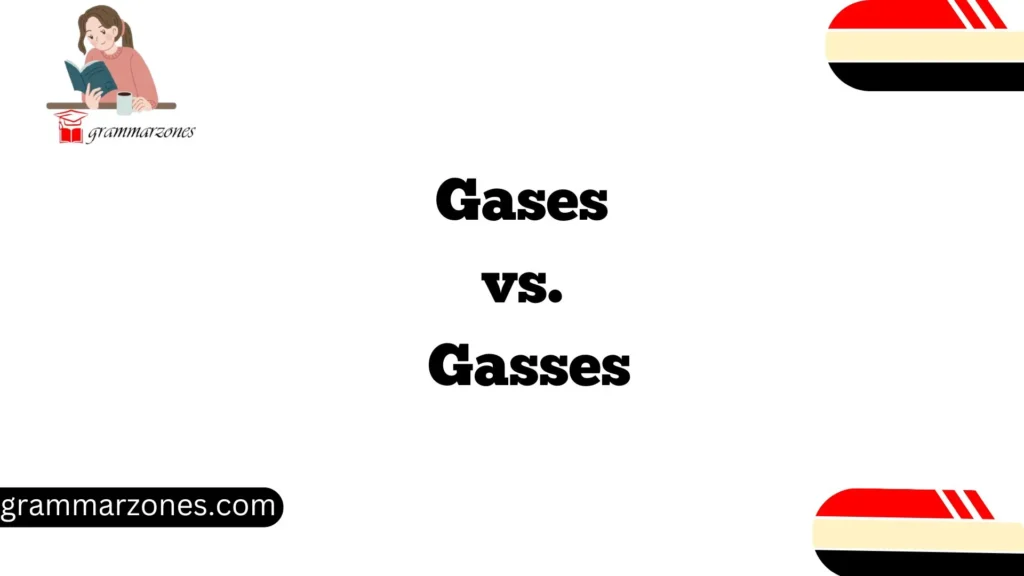When it comes to the English language, even small variations in spelling can stir up confusion. One common mix-up that trips up many people is the difference between “gases” and “gasses.”
While they may look similar, each has its own specific usage, and understanding when to use one over the other can help ensure your writing is precise and clear.
In this article, we’ll delve deep into the distinctions between these two terms. We’ll explore how they’re used in various contexts, the grammatical rules that guide their usage, and provide tips and tricks to help you remember which form to choose.
By the end of this post, you’ll be confident in using “gases” and “gasses” correctly every time.
Understanding ‘Gases’ vs. ‘Gasses’
At first glance, “gases” and “gasses” might seem interchangeable, but in fact, they have different meanings and are used in distinct ways. Let’s break it down clearly.
Gases: This is the more commonly used form, and it’s simply the plural of the word “gas.” In scientific contexts, “gases” refers to various types of gases, such as oxygen, nitrogen, and carbon dioxide. It’s also used in everyday language when talking about substances in a gaseous state.
Example:
- “The gases in the air affect the weather.”
Gasses: This is the less common form and is primarily used as a verb. It’s the third-person singular form of the verb “to gas,” which refers to the act of supplying or using gas, often in a more specific context, such as fueling a vehicle or in military terminology.
Example:
- “He gasses the car every week before driving.”
When to Use ‘Gases’ Over ‘Gasses’
The key to understanding when to use “gases” instead of “gasses” is remembering that “gases” is almost always the correct choice when referring to the plural of “gas.” Whether you’re talking about physical gases in science or simply using the word in a general sense, “gases” is the go-to term.
Common Examples of ‘Gases’
- Scientific Contexts: In chemistry and physics, the term “gases” is used to describe substances in a gaseous state. This includes oxygen, carbon dioxide, hydrogen, and other gases that make up the Earth’s atmosphere.
- Example: “The different gases in the Earth’s atmosphere contribute to global warming.”
- General Use: Outside of science, “gases” refers to any substance that is in a gaseous form.
- Example: “The gases from the volcano spread over the town.”
Exploring ‘Gasses’ as a Verb
While “gasses” is less common, it’s used in a specific context when it functions as a verb. “To gas” means to fuel something, often used when talking about fueling a car or providing gas to another object. In rare instances, it can be used metaphorically or in a military context, but it still carries this core meaning of supplying gas.
Common Uses of ‘Gasses’ as a Verb
- Fueling a Vehicle:
When referring to the act of filling up a car with gasoline, “gasses” is the correct verb form.- Example: “I need to stop and gas up the car before the trip.”
- Note: While “gasses” is grammatically correct, “gas up” is often used colloquially.
- Military Usage:
In a historical or military context, “gasses” has been used to describe the act of exposing someone to toxic gases.- Example: “The soldiers were exposed to chemical gasses during the war.”
The Plural Form of Gas in Science and Everyday Life
In both scientific and everyday contexts, the plural form of “gas” is “gases.” This is the most common usage of the word, particularly in fields like chemistry, meteorology, and physics.
Scientific Usage
- In science, the term “gases” is used to describe different states of matter (solid, liquid, gas) and various gaseous elements or compounds. The study of gases, known as gas laws, is a fundamental part of chemistry.
- Example: “Boyle’s Law is crucial in understanding the behavior of gases.”
Everyday Usage
- Outside of the lab, “gases” is used to talk about things like air quality, cooking, or industrial processes.
- Example: “The gases emitted by factories can harm the environment.”
The Historical Origins of ‘Gases’ and ‘Gasses’
The roots of these two words go back to the evolution of the English language. “Gas” itself is a relatively recent word, coined in the early 17th century by the Flemish chemist Jan Baptist van Helmont. He used the term “gas” to describe a substance that was neither solid nor liquid.
When it came to the plural form of “gas,” English writers initially used “gasses,” mirroring the pattern of doubling consonants for pluralization. Over time, “gases” became the more common form, aligning with standard English rules.
The Evolution of ‘Gas’
- Early Usage: The first use of “gas” was as a philosophical and scientific term. “Gasses” was used as its plural form early on.
- Modern Usage: Over time, the plural form “gases” won out as the standard spelling. It became the accepted way of referring to multiple substances in the gaseous state.
Grammatical Rules Behind Doubling Consonants in English
The rule for doubling consonants when adding suffixes is a common point of confusion in English. For example, in verbs that end with a single consonant preceded by a single vowel, we typically double the consonant before adding an ending like “-ing” or “-ed.”
However, in the case of “gasses,” the double “s” is not related to a standard rule of conjugation. Instead, it’s the result of a historical spelling convention that has persisted in certain contexts, particularly with verbs like “to gas.”
Examples of Doubling Consonants
- Hopping (from “hop”)
- Gassing (from “gas”)
When Not to Double the Consonant
- Gas (as a noun) forms the plural “gases” without doubling the “s.”
- Gas (as a verb) forms “gasses” in its present tense.
Common Misunderstandings and Mistakes with ‘Gasses’ and ‘Gases’
Even though these words are quite distinct, many people still get them mixed up, especially in writing. Here are some of the most common errors:
- Confusing the Noun and Verb Forms:
- Incorrect: “He filled the gasses in the car.”
- Correct: “He filled the gas in the car.”
- Overusing ‘Gasses’ in Plural Contexts:
- Incorrect: “The gasses of the atmosphere are constantly changing.”
- Correct: “The gases of the atmosphere are constantly changing.”
- Mixing Up ‘Gasses’ and ‘Gases’ in Colloquial Speech:
Some people use “gasses” colloquially instead of “gas,” but this is grammatically incorrect.
Practical Tips for Remembering the Difference
Here are some simple tips to remember when to use “gases” and “gasses”:
- Gases = Plural: If you’re referring to more than one type of gas, you almost always want to use “gases.” Think about gases like oxygen or carbon dioxide—always plural.
- Gasses = Verb: When you’re talking about the act of fueling something, use “gasses.” For instance, you gass up your car.
- Mnemonic Trick: Remember that “gasses” has two S’s because it’s related to an action (just like “s” for “supply”). “Gases,” on the other hand, is just the regular plural.
Helpful Mnemonics to Make It Stick
To help solidify the difference in your mind, consider these simple tricks:
- Gases = Multiple substances in the air, water, or atmosphere (just think of it as “the gases of the world”).
- Gasses = A verb for something you do (like fueling or gassing up). The double “s” is a clue that you’re dealing with an action.
Using ‘Gases’ and ‘Gasses’ in Sentences
Let’s put everything we’ve learned into practice. Here are some examples to show how both “gases” and “gasses” should be used in sentences:
Correct Use of ‘Gases’:
- “The gases released from the factory polluted the air.”
- “We need to study the different gases that make up the atmosphere.”
- “He used the gases in the laboratory to conduct his experiment.”
Correct Use of ‘Gasses’:
- “She gasses up the car every Friday afternoon.”
- “He gasses the grill before starting the barbecue.”
- “The soldiers were gassed during the battle.”
Conclusion
Understanding the difference between “gases” and “gasses” is important for clear communication, especially in professional or scientific contexts. The key is simple: “gases” is used to refer to the plural form of “gas” (the substance), while “gasses” is used as a verb (to fuel something or to subject someone to gas).
By following a few basic rules, keeping an eye out for common mistakes, and using the mnemonic tricks provided, you can master this distinction.
So, next time you write or speak, remember: “gases” is for the substances, and “gasses” is for the action. Happy writing!
FAQs About Gases vs. Gasses
1. What’s the main difference between “gases” and “gasses”?
- Gases is the plural form of “gas” (the substance), while gasses is the verb form, meaning “to supply or emit gas.”
2. Is “gasses” ever used as a plural noun?
- No. The correct plural of “gas” is gases. Gasses is only used as a verb.
3. How do I know when to use “gases” in a sentence?
- Use gases when referring to multiple types of gas substances, like in scientific or everyday contexts (e.g., “The greenhouse gases cause global warming.”).
4. Can “gasses” be used in everyday language?
- Yes, but only as a verb. For example, “He gasses up his car every week.”
5. Is “gasses” considered incorrect spelling?
- Not when used as a verb. However, using gasses instead of gases for the plural noun is a common mistake.

“Emma Rose is a dedicated language enthusiast who loves to explore the beauty of English grammar and writing. Through GrammarZones.com, Emma shares her expertise and passion for language, offering helpful resources and engaging lessons for learners at all stages.






